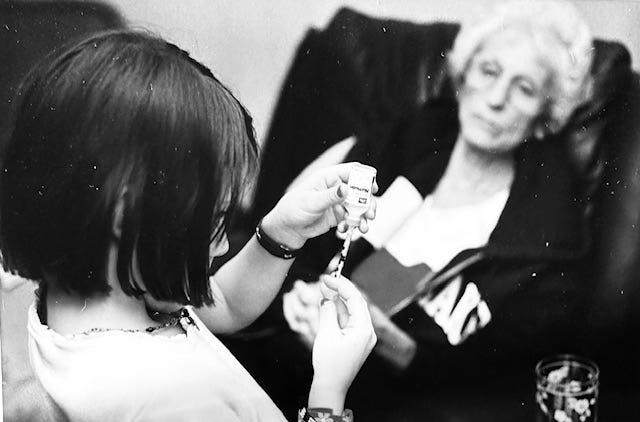You Gotta Die of Something Part I
Part I
My mom’s relationship with alcohol was a curious one—at least when I was young and thought that logic could win against addiction. We all know that is not a fair fight because of all the time and training addiction does to get into shape. It’s pretty good at knocking anybody out and raising its arms in exuberant victory.
Mom’s frequent retort when anyone tried to reason with her that her drinking problem could take her life, like it had her siblings’ lives, was, “Ya gotta die of something.” Laughter usually followed, especially if other drinkers were in the crowd to support her joke. “May as well enjoy life while I can.”
What none of us knew until it was too late was that dying of cirrhosis of the liver was no easy task. This would not be a death that would sneak up on you in the middle of the night. By the time a doctor declared my mother’s diagnosis, she had damaged too much of her liver to ever hope for any rumored regeneration we had heard possible for the organ. Instead, doctors said she would likely only live a few months. And in that time, my husband and I learned some handy medical skills in what seemed like accelerated, advanced training.
We brought my mom into our home on a split-second decision between either taking her directly from the hospital to a nursing home to finish out her days, or to our home with us as caretakers for what seemed likely to be only a short time. We decided to steel ourselves against the temptation to give into the flight response and, instead, fight to keep her from dying alone somewhere.
At first, we attacked each symptom with energy and a determination to provide comfort in my mom’s last days. Fluid would build up in her abdominal cavity, giving her the strange appearance of a pregnant septuagenarian, and awful discomfort too. Malnourished and skeletal everywhere else but the belly. As the months stretched on, for the prediction of a short time left did not come to pass, we frequently scheduled an outpatient procedure of siphoning off the fluid. My “medical training” caused this horrific practice to become routine. I sat in the room with a Good Housekeeping, flipping through recipes and such while a tube was inserted into my mother’s abdomen with the other end hanging into a utility bucket. A steady flow filling the pail, apparently with the same laws of physics we used with our garden hose draining our little above-ground pool each summer to start out fresh. Dirty water out for relief, yes, but it wouldn’t be long before the fluid, like a river, flowed back into the gaps around the organs and pooled up again.
And then there was the Lactulose, a diabolical medication. The way it was supposed to work—take a swig or two every day, and the extreme laxative effect would clear her brain of the ammonia build-up from being unable to process protein with a shotty liver. That ammonia by-product would fog her up to a drunken state, with the slurred speech and shaky legs and all. We had enough discussions on what kind of dramatic irony this was that a disease you got from drinking too much had the same effects as the fun you had getting the disease, only this wasn’t fun. You couldn’t stay ahead of all the symptoms careening out of control. And sitting on the toilet to clear your head stripped you of the dignity you desperately wished for at this stage of a disease. Diabetes soon followed, so the whole family, even my young children, trained in blood checks and readying the insulin injections.
And speaking of dramatic irony, I was the daughter who had the most trouble with my mom’s addiction growing up, yet I was thrown into the role of caretaker quite suddenly. By suddenly, I mean that my mom was diagnosed in November, just weeks before my dad passed away. In fact, at his funeral, I seriously thought I would have to lay her to rest right on his heels, so we gave a brief heads-up to the funeral director. By January, my mom was living with us. Or preparing to die with us.
I do not pat myself on the back for taking my mom in. I do not judge people who find other arrangements. I did not do it for some sort of redemption or out of obligation. And probably some of you reading this have cared for a sick family member with more virtuous convictions. We just did it and sort of figured things out as they went along. But no doubt about it--this was hard. Hard on the family. Hard for my mom who always pictured living out her later years in Florida in a nice little condo (she so loved sunshine), maybe playing bridge at the clubhouse and sitting by the pool with a cold drink in her hand, enjoying time “around people her own age,” she used to say. This contrast to her imagined senior years was no quality of life at all . . . so she quit. If she had to live like this, she would rather die. And we had to prepare ourselves—this would happen in our home.
Part II Coming Soon



This is beautiful, Shell. Thank you. You make room for both grace and dignity in this piece, and that’s a wonderful gift to your mom’s memory and the reader.
On those rare occasional when I sit down to truthfully tell the hard stories of my life, I often am unable to find either grace or dignity, and, even so many years later, feel depleted and fearful that I may I spent my allowance of both in the moment, and have none left for the telling.
Again, great work. Thanks for showing the possible.
Man, I’m so invested in your mom’s story!